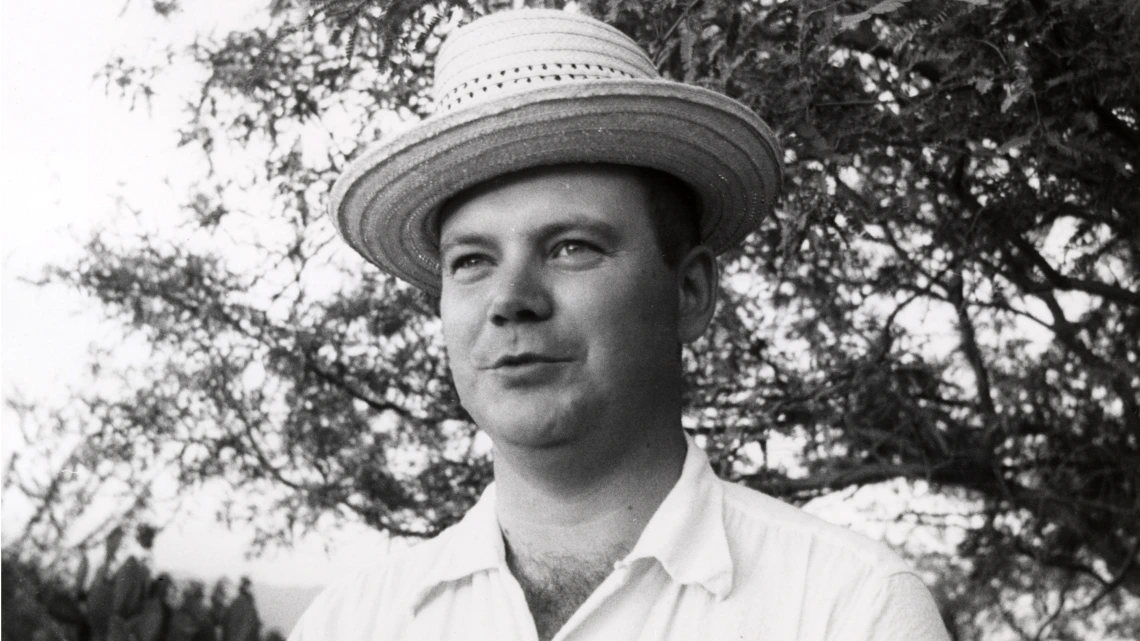Henry F. Dobyns papers

Photograph of Henry F. Dobyns, circa 1960-1975.
Collection area: University of Arizona
Collection dates: 1732-2009 bulk (bulk 1950-2000)
Papers, 1732-2009 (bulk 1950-2000). This collection consists of the papers of Henry F. Dobyns relating to his professional career as an anthropologist and ethnohistorian. The bulk of the material includes Dobyns’ extensive writings as well as manuscripts and research materials related to his work on the Cornell Peru Project and with the Gila River Indian community. Also included is correspondence, research material such as copies of archival research, field notebooks, news clippings and notes, academic material such as administrative and teaching material and material related to his professional career as well as photographic material which includes personal photographic albums and photographs, negatives and slides primarily related to his work in South America and with Native American tribes. Index card files containing research notes, book and articles citations and news clipping are also included. This collection contains material in Spanish. This collection also contains books and maps that can be found in the University of Arizona catalog under Henry F. Dobyns Library.
Henry Farmer Dobyns, Jr. was born in Tucson, Arizona on July 3, 1925 to Henry F. and Susie Kell (Comstock) Dobyns but spent most of his childhood in Casa Grande, Arizona. After graduating from Casa Grande Union High School he entered the U.S. Army in 1943 but spent most of his service in the hospital after contracting rheumatic fever. Following his service he attended the University of Arizona where he received a Bachelor of Arts Degree in Anthropology in 1949 as well as a Master of Arts Degree in Anthropology in 1956. In 1948 he married Zipporah Pottenger and had four children, Rique, Bill, Maritha and Mark. From 1949 to 1952 he acted as an instructor at Cornell University’s Field Laboratory in Applied Anthropology in Arizona and New Mexico. While a graduate student he began his prolific publishing career, winning the Bronislaw Malinowski Award from the Society of Applied Anthropology in 1951 for his article "Blunders with Bolsas."
Dobyns began working with Native American tribes on land claims and water rights case as a graduate student at the University of Arizona in 1952, work he continued for 50 years with various tribes. From 1952 to 1956, along with Robert Euler, he gathered ethnohistorical and archaeological evidence for the Hualapai Tribal Nation’s land claims case and acted as an expert witness before the U.S. Supreme Court with much of the information in his M.A. thesis being used in the Indian Claims Commission hearings. He also spent three decades working as a consultant for the Gila River Indian Community in their litigation over water rights.
Dobyns received many fellowships in support of his research including the National Science Foundation fellowship from 1956-1957 and the Social Science Research Council fellowship in 1959 before receiving his Doctorate in Anthropology from Cornell University in 1960. He joined the Cornell Peru Project in 1960 where he worked in a number of positions including research coordinator from 1960-1962, Peace Corps coordinator from 1962-1964, coordinator of the Comparative Studies of Cultural Change program as well as the Coordinator of the Andean Indian Community Research and Development project from 1963-1966 and finally the Associate Director of the Cornell Peru Project before becoming Director of the project following the death of the former director, Allan Holmberg. Dr. Dobyns married his second wife, anthropologist Dr. Cara Richards in 1958 and had one child, York Dobyns. In 1968 Dr. Dobyns married his third wife Mary Faith Patterson.
Dobyns taught at a variety of institutions over his long academic career. In 1966 Dr. Dobyns became the Chairman of the Department of Anthropology at the University of Kentucky. He joined the staff of Prescott College, Center of Man and Environment in 1970 as a professor and later as the Vice-president for Academic Affairs. He also taught at the University of Florida-Gainesville (1977-1979), University of Wisconsin-Parkside (1974-1977, 1983-1984) and the University of Oklahoma (1989). He also worked as a senior researcher at the Bureau of Applied Research in Anthropology at the University of Arizona and on projects for the National Park Service. From 1971 to 1976 Dr. Dobyns edited the Indian Tribal Series, a 40 volume series of tribal history and culture of which Dobyns wrote six volumes.
Dobyns was a National Endowment for the Humanities research fellow at the Newberry Library in Chicago and in 1983 he directed a seminar on Native American Historical Demography also funded by the NEH. In the 1980s and 1990s he returned to the Newberry Library each summer to contribute to the NEH Summer Institute in Native American Literature.
Dobyns was a prolific author who conducted extensive research. He may be best known for his work in historical demography including the article "Estimating Aboriginal American Population: An Appraisal of Techniques with a New Hemispheric Estimate" (1966). A few of his other works including Papagos in the Cotton Fields (1951), The Ghost Dance of 1889 among the Pai Indians of Northwestern Arizona (1967), Spanish Colonial Tucson: A Demographic History (1976), Indians of the Southwest: A Critical Bibliography (1980),
A collection guide explains what's in a collection. New to using our collections? Learn how to use a collection guide.
Collection guideAccess this collection
Visit us in person to access materials from this collection. Our materials are one-of-a-kind and require special care, so they can’t be checked out or taken home.
How to cite
Learn how to cite and use materials from Special Collections in your research.
